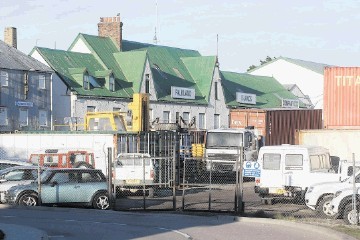
For its part, the Falkland Islands Development Corporation didn’t have any oil and gas content in its business plan of a year ago.
“Until the point where any discovery was judged commercial, there was a reluctance to devote resources into energy,” said its general manager, Marc Boucher, a Canadian appointed to the job a year ago.
However, the game-plan has changed and FIDC says it is ramping up engagement with Rockhopper particularly, but also with the other operators, to begin to understand the rules of the game or engagement relative to contracts.
“We’re now very much preoccupied by having local businesses benefit to the maximum from forthcoming developments,” said Boucher.
“We already have businesses that have invested significantly from their own resources; meanwhile others are becoming more interested. But there needs to be a roadmap to first of all enable them to be accepted as contractors . . . potential bidders.”
However, there is no such thing as a supply chain gateway process in the islands . . . nothing even starting to resemble the systems in the UK and Norway. Indeed why should there be?
Boucher said FIDC is working to bring both sides together with a view to ensuring local content. That is an important issue for the Falklands.
He said the oil companies needed to understand that they and their tiers one and two contractors will have to devote time and effort to coaching local firms . . . mostly micro-businesses.
“Premier, for example, is very proud of its ISO 14001 certification as a corporate body, but what does that mean to a Falklands business? Is there any impact? And then there are other schemes aside from such certification; such as the safety compliance and other criteria.
“We have to engage with the procurement officers of these companies to ensure that there is a trickledown understanding of their contractors and precisely what it is that they’re looking for.”
Up to this point, this business community has been dealing with a set of very committed, in a sense, local companies. Therefore engagement has been relatively easy.
Premier’s not big, but its farm-in with Rockhopper brings a different kind of player into the Falklands, and the farm-ins between Noble Energy and Edison with Falklands Oil & Gas change the situation for local businesses even more. Is it not just as well that it all started the way it did?
Boucher: “This is where the regulators and development bodies such as ourselves and the business community have to work together to ensure not only the maximum from royalties and taxation, but also development and expansion of local businesses.
“There’s always reference to how small the market is here . . . how small the businesses are too. However, some firms are already involved in the game; they’re savvy enough to have done so. But they need to have an understanding of what they need to make real progress and be in a position to bid for what will probably be significant contracts up-coming by 2014-15.
“It is our role to make sure that they (the oil companies) understand the local business community, that there is a business community to start with, moreover its actually quite sophisticated and diverse. We manage the fisheries extremely well and they can be just as successful with the oil and gas industry.”